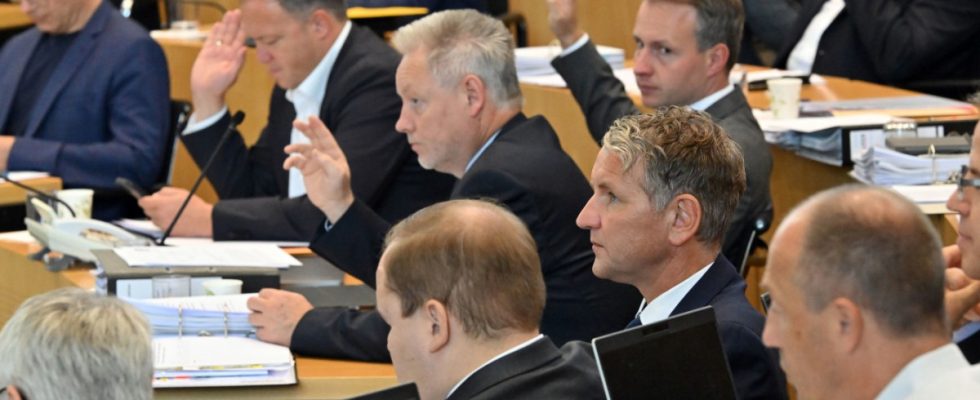The opposition has pushed through a tax cut in Thuringia for the first time against the will of the red-red-green government. A CDU bill for a lower real estate transfer tax received a majority in the Erfurt state parliament on Thursday because, alongside the FDP, the AfD contributed the decisive votes.
It was decided by 46 votes to 42 to reduce the real estate transfer tax. Home builders and property buyers only have to pay 5.0 instead of 6.5 percent tax. According to forecasts, the country’s loss of income is 48 million euros annually.
The CDU initiative caused a stir and raised questions among political competitors as to how the largest opposition faction in the Thuringian state parliament felt about the firewall against the AfD, which is classified as right-wing extremist in Thuringia by the Office for the Protection of the Constitution.
The governing coalition criticizes the vote as a “unique event”
Representatives of the government coalition of the Left, SPD and Greens criticized the fact that the FDP and CDU voted for the tax cut together with the AfD as a “unique process” and, according to left-wing Prime Minister Bodo Ramelow, as a “pact with the devil”. The CDU is giving the AfD leeway and influence on the state budget, said Left parliamentary group leader Steffen Dittes. The largest opposition party is beginning to “actually set in motion a small government coalition in the opposition, including the AfD.” Shortly before the vote, Ramelow invited CDU parliamentary group leader Mario Voigt to talk about alternatives to supporting families. The state parliament session was temporarily interrupted due to constitutional concerns regarding passages of the CDU law.
The CDU federal chairman Friedrich Merz defended the actions of the Thuringian CDU parliamentary group before the vote. “We do not make what we discuss in the state parliaments and in the German Bundestag dependent on other factions,” Merz said on RTL on Thursday morning. There will be no cooperation with the AfD at the federal or state level. “It stays that way.” Voigt argued similarly, justifying the tax cut with family support for their own homes and impulses for the ailing construction industry and the skilled trades. “We cannot make solving problems dependent on the wrong side threatening to agree,” he said repeatedly.
The majority situation in the Thuringian state parliament is difficult: Ramelow’s red-red-green coalition has not had its own majority since taking office in 2020 – it is four votes short in parliament. She is always dependent on compromises when making decisions, so far especially with the CDU. A new state parliament will be elected in Thuringia in 2024.

